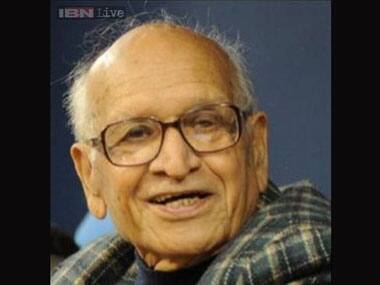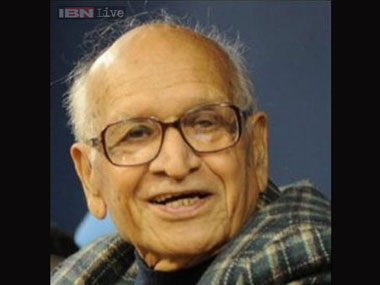While a number of leaders and scholars expressed grief over the demise of veteran historian Bipan Chandra, President Pranab Mukherjee condoled his death saying the country had lost one of its “foremost scholars on modern India” who had an immense contribution towards the study of Indian history. Others heaped rich praise on the left-leaning scholar too, notably Pratap Bhanu Mehta who wrote in The Indian Express that such was Chandra’s influence that he has more or less defined the mainstream establishment’s understanding of modern India. Through his two best-selling narratives of modern Indian history and several other etxtbooks, Bipan Chandra’s account of modern India was almost “inescapable”, Mehta writes. [caption id=“attachment_1689921” align=“alignleft” width=“380”]  Bipan Chandra. Ibnlive[/caption] “He was successful in articulating a usable political history, and then openly practicing history as ideology by other means. His assumptions are now so widespread that we forget what an achievement it was to make them hegemonic. One assumption, clearly articulated in Communalism in Modern India, was that while communal consciousness could exist in pre-Modern India, communalism could not,” Mehta says in his tribute. Chandra, a Padma Bhushan awardee, had donned multiple roles including that of chairperson of the Centre for Historical Studies, Jawaharlal Nehru University, Member of the University Grants Commission (UGC) and the Chairman of the National Book Trust (NBT). As NBT chairman, Chandra successfully revived the Nehru-era organisation. Chandra had authored several books including The Rise and Growth of Economic Nationalism, In the Name of Democracy: The JP Movement and the Emergency, Nationalism and Colonialism in Modern India and The Making of Modern India: From Marx to Gandhi, among others. He was also founder of the journal Enquiry and was a member of its editorial board for many years. The History of Modern India is almost a bible for modern Indian history students, selling over 250,000 copies in English. Another obituary in The Telegraph says Chandra’s reputation as a “students’ professor” is what generations of students will remember foremost, including those who disagreed with his political ideology. The Telegraph article recounts tales around Chandra’s beat-up Fiat car that he drove around in JNU in the 1970s, a car in which he offered rides generously but one that would break down frequently with those hitching a ride then having to push. “Once you were with him in the car, he would get so animated in intellectual discussions and debates that he would remove his hands from the wheel and start waving them in the air,” Chandra’s student and fellow historian Aditya Mukherjee was quoted as saying. “It was scary.” Having increasingly relied on his wife Usha since 2009 to read out to him, her death in 2009 came as a big blow.
While a number of leaders and scholars expressed grief over the demise of veteran historian Bipan Chandra, President Pranab Mukherjee condoled his death saying the country had lost one of its “foremost scholars on modern India” who had an immense contribution towards the study of Indian history.
Advertisement
End of Article


)

)
)
)
)
)
)
)
)



